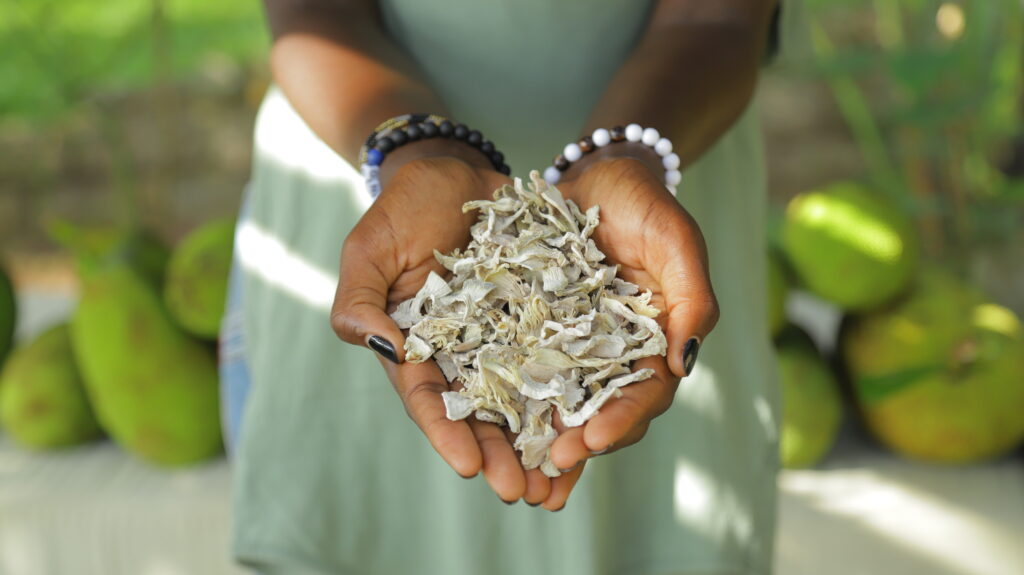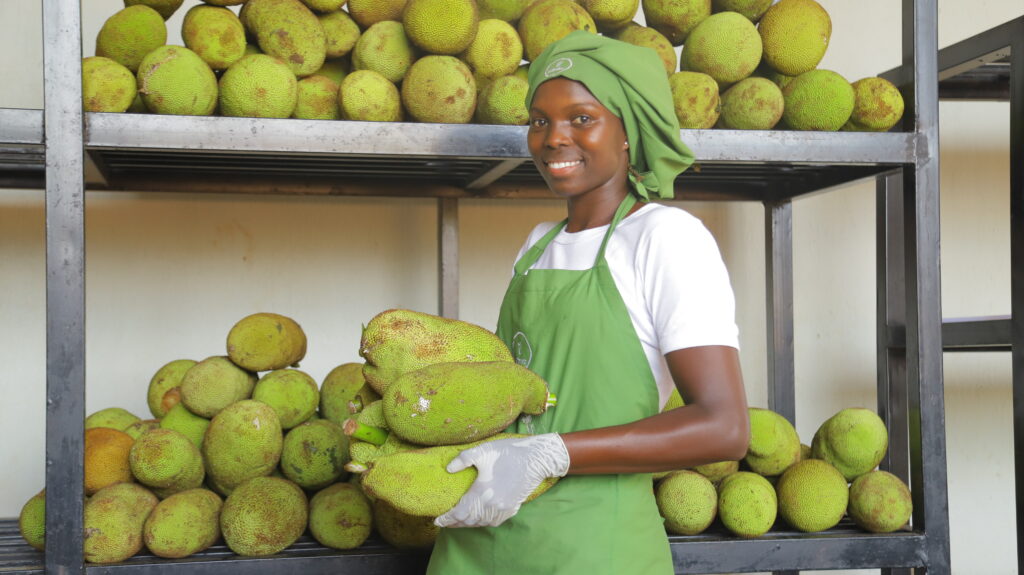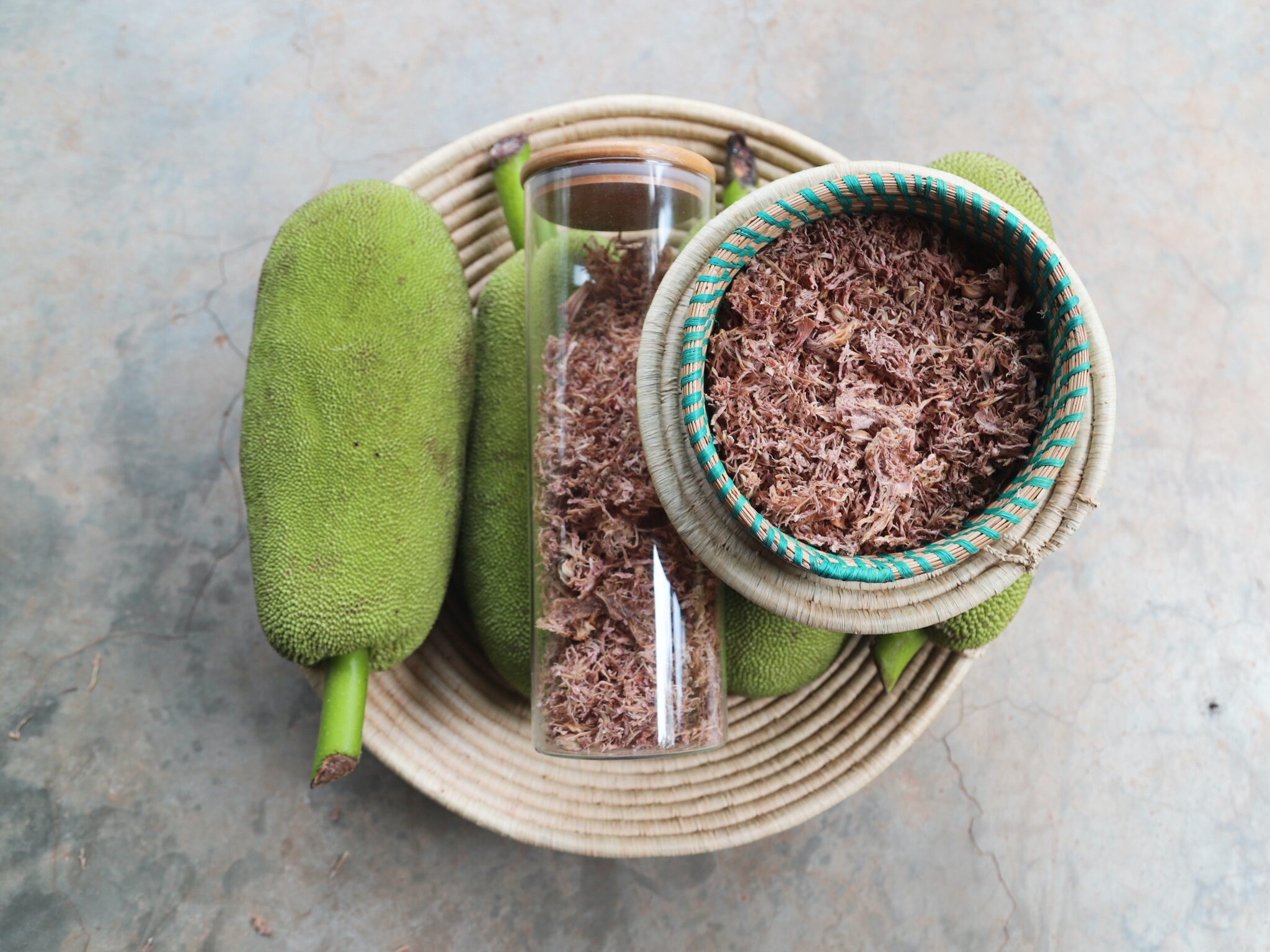PrimeJack: Why Fiber Foods is Championing Dehydrated Jackfruit as A Solution for Plant-Based & Blended Meat
7 Mins Read
Ugandan women-led company Fiber Foods is using a food that often goes to waste, and turning it into an ingredient that can solve plant-based and blended meat’s texture problems, servicing consumers’ increased fibre needs, and supporting local farmers via value chains.
An ingredient that can produce better meat analogues, help reduce meat consumption via more appetising blended meat products, provide a whole-food, fibre-packed option to increasingly health-conscious consumers, and boost the side income of local farmers through agricultural value chains. Sound intriguing?
That’s exactly what Fiber Foods is doing. A female-led business based in Uganda, the company is championing jackfruit as an ingredient that can address multiple pain points in the food system: whether that’s our overconsumption of meat, concerns surrounding meat alternatives, or food insecurity.
Jackfruit has already been adopted as an alternative protein solution by many producers, including Jack & Annie’s, Upton’s Naturals, Karana, Jack & Bry, and The Jackfruit Company. But Fiber Foods is approaching the fruit in a novel approach, opting to dehydrate it and offering it as an ingredient called PrimeJack, which comes in multiple shapes and sizes for manufacturers to use jackfruit as an ingredient in plant-based or blended meat applications.
“We started the company to create opportunities for women and girls in agro-processing,” says co-founder Ineke Aquarius. “[We do this] by selecting a crop that was already growing in the traditional agroforests of smallholder farmers and was not yet commercialised, which means it is the domain of women.”
She notes that while living in Uganda, she and her co-founder Inez van Oord “saw a lot of Jackfruit going to waste”, just as it appeared in more and more vegan applications in Europe. While jackfruit trees are “true climate champions” in smallholder agroforests, the lack of a market meant these were being cut down. “The fact that the trees were already there, but without commercial value, made it a ‘female crop’, which gave us the opportunity to work with women,” she says.
A fibre-packed product for meat analogues

The company developed its patent-pending tech for PrimeJack over three years, turning young fruit into an ingredient that can be produced on a large scale. It has established a production line, lab and research time in East Africa, to boost growing, harvesting and processing efficiencies for jackfruit. Meanwhile, it has a lab in the Netherlands, which is responsible for designing new applications and ingredients using PrimeJack.
Aquarius explains that the company decided to dehydrate jackfruit for sustainability reasons, reducing the volume of the product by 90%, which drastically cuts transportation emissions. “We found various other advantages,” she adds. “PrimeJack absorbs flavours in the rehydration process up to the core of the fibre, has a long shelf life and can be shipped in normal sea containers, and is not kept in brine like the pasteurised jackfruit and has therefore no sour off taste and is easier to apply in an industrial setting.”
The product will also appeal to food producers looking to improve their Nutri-Score. While jackfruit itself is low on protein (the rehydrated formulation has 1.7g per 100g), the real benefit is the fibre content, which is 8.1g per 100g once rehydrated. Fibre is an increasingly important nutrient for people, with fibre-rich diets linked with a lower risk of obesity, type 2 diabetes, strokes, high cholesterol and heart disease. Plus, it regulates incretin, a hormone described as our body’s “natural Ozempic”, given it boosts GLP-1 to control appetite and metabolism – this makes fibre-packed foods a priority in the booming gut health era.
Animal products like meat, meanwhile, don’t contain any fibre, contributing to the lack of fibre in our diets. To tackle that problem, Fiber Foods is targeting the alternative protein space, offering PrimeJack for both vegan and blended meat (which combine conventional meat with plant-based ingredients) products.
“In plant-based meat formulations, we have developed products that consist of up to 70% rehydrated PrimeJack,” says Aquarius. “However, the market for such products is smaller,” she adds. “In blended meat, up to 30% of the meat can be replaced by 4% PrimeJack, and the rest is water.”
Jackfruit makes for better blended and plant-based meat

Blended applications enable a product that is “lower cost with better nutrition and footprint”, according to the company. To illustrate this, Fiber Foods explains how a 100% beef burger has more fat (including saturated fat) and sodium than a 70% blended burger, which has 1.7g of fibre versus none for the former. In terms of protein, the conventional burger has 25g per serving, while one blended with PrimeJack contains 19g.
The ingredient has a natural flavour too, meaning it wouldn’t take away from the taste aspect of meat, which is the most important consumption driver for consumers. “The advantage of having no flavour or taste, but a high absorption potential, is that the food developer can add any flavour they desire,” says Aquarius. She reveals this could also work with cultivated meat in hybrid applications. “But the quickest win is to replace 20-30% meat for PrimeJack and reduce price, footprint and improve Nutri-Score without changing the recipe.”
All this is why Fiber Foods secured financing from agrifood tech investment fund FoodSparks, which was launched by PeakBridge and EIT Food, in January. “Fiber Foods has a strong value proposition to improve the healthiness, Nutri-Score and sustainability of existing meat alternatives and hybrid meats,” says Thomas van den Boezem, principal at PeakBridge. “Their unique product and process also make a strong business case, backed by an experienced and inspiring founding team, with a high understanding of customer needs.”
He adds that as an ingredient, jackfruit ticks all the boxes: no bad taste, low price, fictional, and sustainable. “With Fiber Foods’ unique process, jackfruit addresses a number of key problems in existing meat alternatives and hybrid meats. Jackfruit fibres provide structural benefits to the end product, with zero negative taste impact,” he explains. “The health benefits are substantial, since it’s fibre-rich, and allergen and cholesterol-free. Plus, jackfruit trees are abundant and can be accessed with existing infrastructure, making the ingredient a highly affordable option for plant-based meat alternatives.”
Fiber Foods has just completed a life-cycle assessment, which revealed that its current production line emits 0.34kg of carbon per kg of rehydrated PrimeJack – compared to 15-30kg and 5-12kg for the same amount of beef or pork, respectively, as well as 0.7kg for Quorn’s mycoprotein. “Based on our LCA results, we are developing a plan to further lower our footprint to move to net zero in the new factory that we are establishing,” says Aquarius.
To make PrimeJack, the company peels its jackfruit first – research has shown that about 70-80% of a jackfruit consists of waste and byproducts. The peel also makes up 30% of the Fiber Foods’ jackfruit waste, one of its biggest sources of emissions. But it leaves no traces of the product in its processing hubs, having partnered with Ugandan insect protein producer Proteen.
Fiber Foods’ mission as a social enterprise

Beyond the nutrition and climate aspects, the social element of Fiber Foods is what really stands out. As a women-led company, its focus has always been to champion women’s rights and provide them with economic opportunities. The company has been building agricultural value chains to help smallholder farmers in Uganda and Kenya with an additional source of income.
These value chains allow farmers to earn a side income from crops that still need to be commercialised, but maintain the regenerative balance in their farms, alongside cash crops like coffee, cacao and vanilla. The company is now developing a second value chain through oysternuts, and says it’s contributing to UN Sustainable Development Goals 1, 5, 8 and 12 through fair prices for farmers, gender-sensitive value chains, economic growth for the agriculture sector, and promoting sustainable food systems.
Fiber Foods currently has 3,000 farmers in its value chain, with 30% of them women. By next year, it hopes to double the number of smallholders in its system to 6,000, with at least half of them being women. The startup has further created an ESG tool to trace its ingredient from farm to fork. “We have developed a traceability tool that works in the context of our farmers, in a multi-cropping food system both off- and online. The farmer data is connected to another tool, ISO2HANDLE, to link the jackfruit all the way to the consumer,” notes Aquarius.
“The traceability aspect is extremely important: applying regenerative agriculture principles and high ethical sourcing standards to produce their dehydrated jackfruit in Uganda,” says van den Boezem.
Aquarius says over 10 products containing PrimeJack made by its B2B partners have already been approved (or are in the process) to appear in big retailers this year. It is now preparing a large-scale production of blended meat products for retail and – as she ascribed to above – building a new dedicated jackfruit facility in a joint venture with its current production partner.
Despite all that, the social mission still remains high on its priority list. “Jackfruit grows year-round and provides farming families with a reliable side income, besides their seasonal cash crops like coffee or vanilla that are volatile and affected by climate change,” Aquarius says. “By processing the jackfruit in Uganda and Kenya, close to the source, job opportunities are created for mostly young women.”




